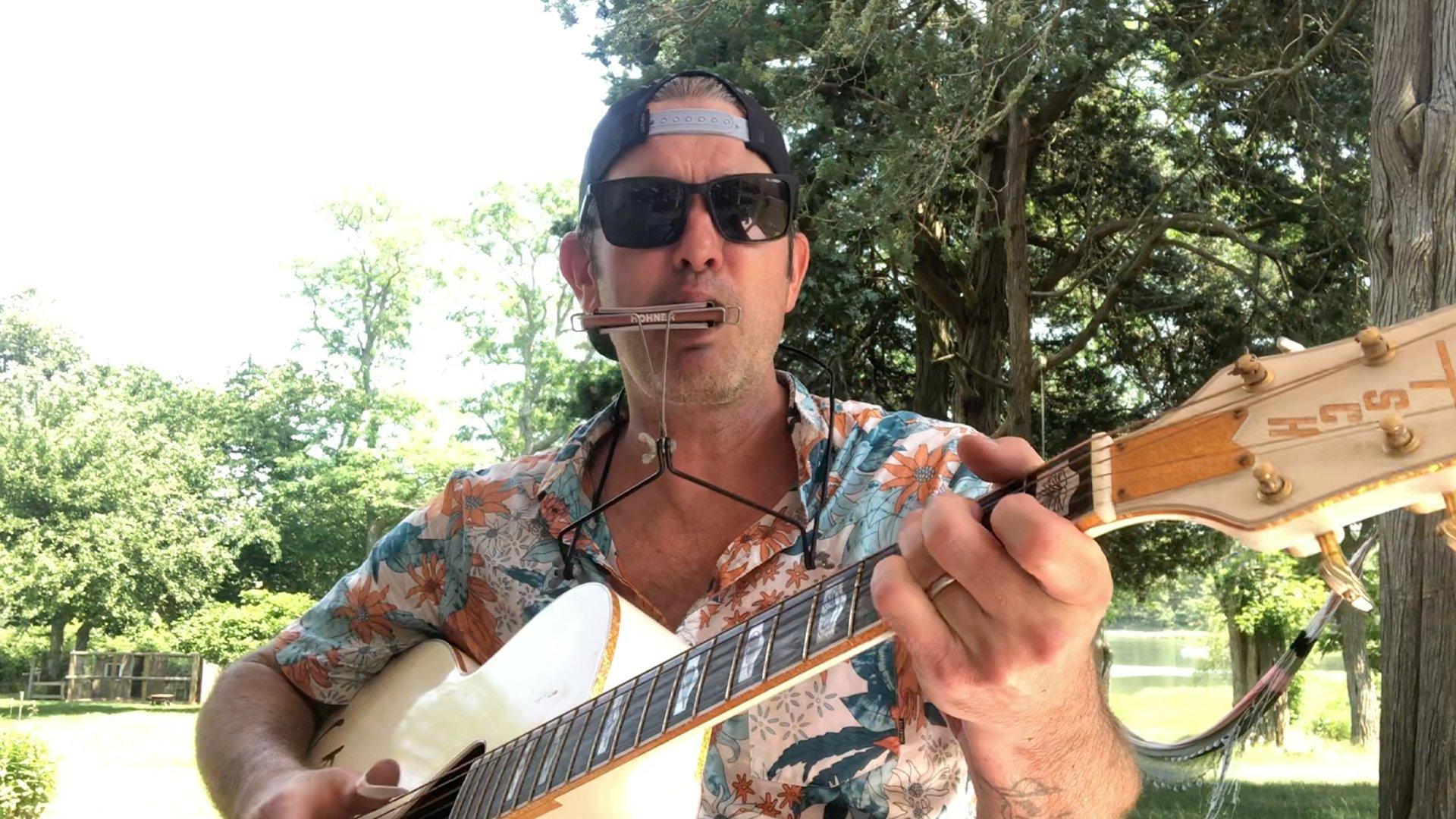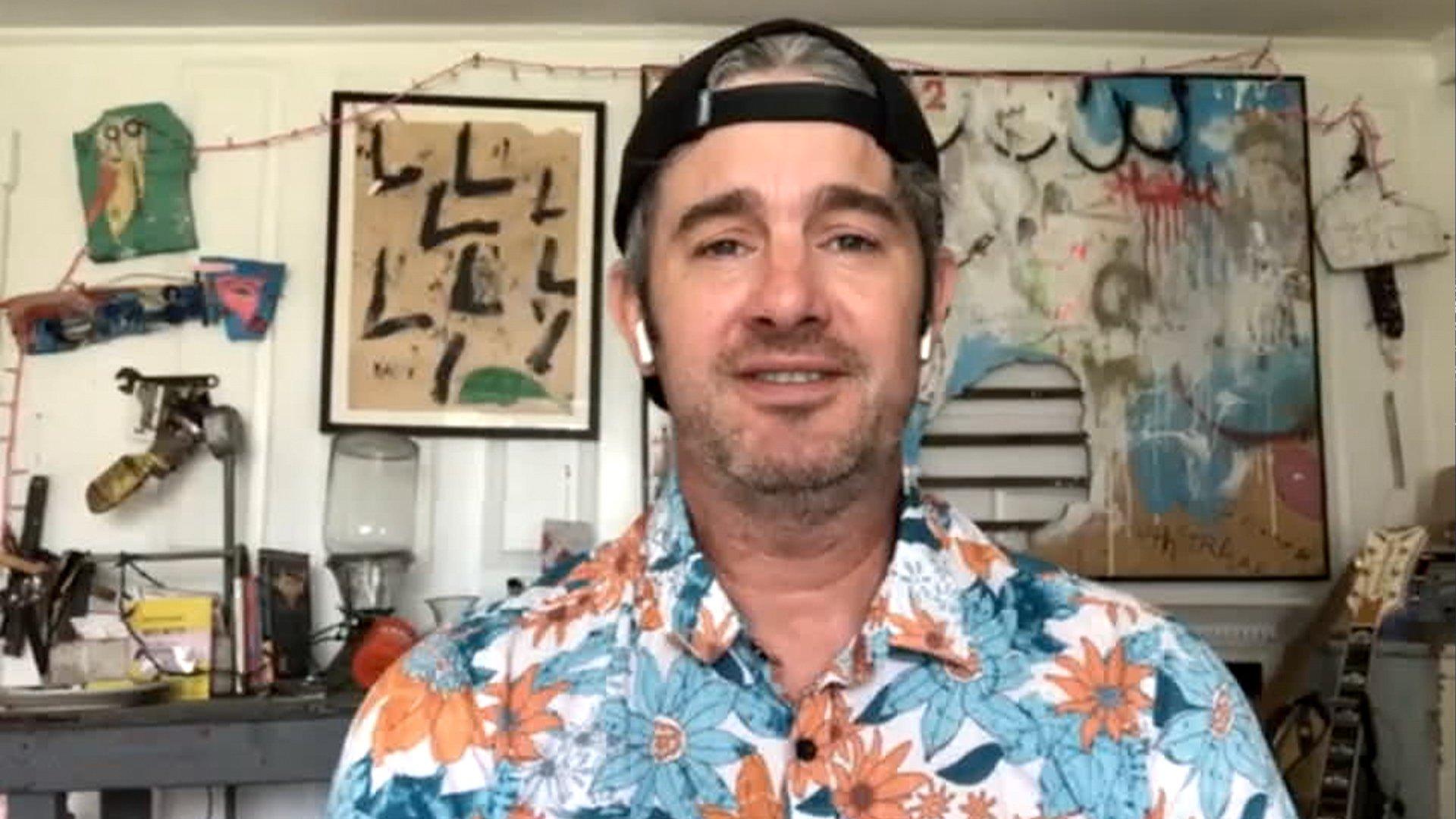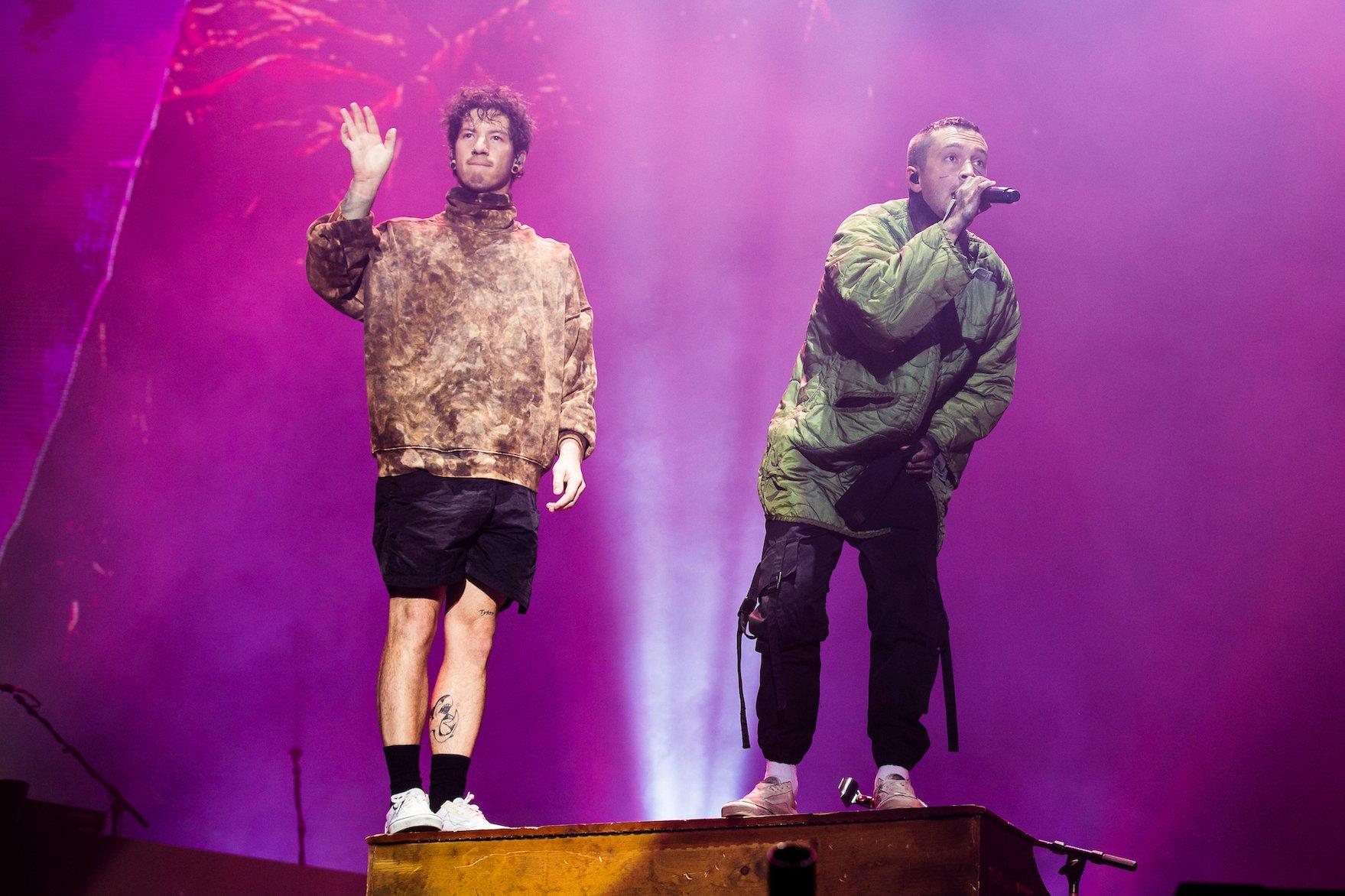Photo: Joe Navas

feature
G. Love On 'G. Love & Special Sauce' At 30: Revisiting A Classic Document Of The Hip-Hop Blues
G. Love and Special Sauce's self-titled debut hit the college charts hard with a dyad of party anthems, but there was so much more to it. Days before a reissue and supporting tour, G. Love revisits the band's origins, and how the album captured an era.
It's been decades since G. Love was a hip-hop-loving kid living with his parents in Philadelphia. But he kept their breakfast table.
Today, at his cozy-looking Cape Cod home, the artist born Garrett Dutton sits at that very table. Over Zoom, one also notices his conspicuous tattoos. Emblazoned on his left forearm is his seven-year-old's name and birthday; on his right, his three-year-old's. (His eldest is near the crook of his elbow; his two-year-old is pending.
The table and tats make this conversation about his debut album rather poignant. "These songs have given me everything that I love in life," he says of G. Love and Special Sauce's self-titled 1994 debut. "I wouldn't have met my wife if I wasn't a musician; I wouldn't have had my kids.
"Music has really given me everything in my life. In particular, this record," he continues. "So, I'm happy to have this milestone."
Naturally so: G. Love and Special Sauce kicked off a fruitful career in what he calls "the hip-hop blues." While both genres are offshoots of Black American music, with a plethora of common DNA, nobody combined them as Dutton did; strictly speaking, he might be the sole occupant of this lane.
At times, it's been a turbulent ride. Over the ensuing three decades, the music industry's fluctuated, and so have the college rock favorites' cachet — despite releasing albums easily of G. Love and Special Sauce's quality, like 1999's Philadelphonic and 2022's Philadelphia Mississippi. Recently, their drummer, Jeff "Houseman" Clemens, retired from the road.
But the genial, gracious Dutton stayed steady on the wheel. Sure, they're nothing if not idiosyncratic; Google their name and "laid-back" and see how many hits you get. But G. Love has managed to do what numberless acts can't: last.
Happily, in 2024, G. Love and Special Sauce are on an upswing. They remain a live favorite; the thirst for "Cold Beverage" and the rest is unabated. They've signed with new management, in Regime Music; perhaps that nudged them to put some muscle into G. Love and Special Sauce's 30th anniversary.
Indeed, a remastered G. Love and Special Sauce will be digitally re-released Jan. 12, with 11 intriguing live recordings from New York's Knitting Factory in 1994. The day before, the band will kick off a 41-date tour of North America, mostly playing cuts from the album. (Chuck Treece — who Dutton says has been a "ghost member" from the jump — will be behind the kit.)
G. Love and Special Sauce sneakily resonates in 2024 — and not just because it kicked off a career. The refrigerator-ready singles "Cold Beverage" and "Baby's Got Sauce" ruled the roost of college radio, but they're outliers, as hits tend to be: its spirit runs much deeper.
G. Love and Special Sauce is also something of a nexus: from here, you can go in so many directions — from alternative hip-hop to crackly Delta blues to peak 2000s sandals-core, like his longtime colleague Jack Johnson. Could this aesthetic resurge, like shoegaze or indie sleaze or Myspace emo? Revisit G. Love and Special Sauce, and you be the judge.
Back when Dutton's breakfast table sat in Philadelphia, the sounds of the Beastie Boys, Run-D.M.C., Eric B. and Rakim, LL Cool J, Boogie Down Productions, De La Soul, and A Tribe Called Quest lit up Dutton's dome.
"My generation was the first generation of kids to grow up as fans of hip-hop," Dutton explains. But being a practitioner seemed to be off the table.
"I definitely never thought about trying to be a rapper, because at that time, except for the Beastie Boys, Vanilla Ice, and 3rd Base, there were really not many white people rapping," he continues. "Because it was Black music that was coming out of the Black community, and it was so great that it took over the whole world, to where it is now — where it's part of the production on most records, of every genre."
Instead of rocking the mic, Dutton opted to strum an acoustic guitar, and be a folkie a la Bob Dylan. But then he discovered John Hammond, and that was his portal into the blues: Robert Johnson, Muddy Waters, Lightnin' Hopkins, other foundational figures.
As a street musician, Dutton rapped Eric B. and Rakim's "Paid in Full" over a blues riff. Eureka. "It was like the whole sky opened up and the light shined down on me and it was like, 'Oh, this is it,'" he recalls, still seeming in awe."
The band grew from there: at a solo performance in Boston, Dutton met Clemens, and later, bassist Jim "Jimi Jazz" Prescott. Their aesthetic developed around thrift-store polyester leisure suits, pawn-shopped guitars, and an antiquated, oversized kick drum.
"And I know that's where Jack White got his whole aesthetic," Dutton claims. "From seeing me play that pawn shop guitar — except he really dialed it in." (He remembers White rolling up to a Pontiac show that Kid Rock and the Black Crowes' late keyboardist, Eddie Harsch, attended.
Despite being signed to OKeh Records — a subsidiary of Epic — as a "developing artist," G. Love and Special Sauce seemed to arrive fully formed. With Boston as a new base, they caught flame instantly: Dutton describes their Monday night gigs at Irish pub the Plough and Stars as "euphoric… we were kind of blowing up on a local level in Boston."
When it came time to record their self-titled debut, the mission was simple: "We were trying to capture what we were doing live, which we were automatically addicted to."
The album's boomy, organic sound owes itself to minimal isolation, with bleed aplenty: Dutton sang and rapped into "some Italian funky mic I got at the cool music store, because I liked vintage-looking s—." (It's in the ballpark of a bullet mic, which harmonica players use; he fed it into an amplifier.)
"We were trying to capture the essence of the people that we loved, like John Lee Hooker, and Bob Dylan, and all the records that were made from the '40s through the '70s," Dutton says. "Performance records, capturing this amazing magic."
Other than "This Ain't Living," which features piano by mega-producer Scott Storch, and a guest appearance by the rapper Jasper, every note on G. Love and Special Sauce is by the core trio.
Despite its minimalism, G. Love and Special Sauce features a multiplicity of moods and shades. The hypnotic "Blues Music" is a mission statement; you want that mellow, loop-like groove to unspool for miles. "Garbage Man" features a stony Bonham-esque groove, with a gigantic kick drum sound and one of Dutton's darkest and most steely-eyed flows.
Highlights are all over the place: the grimy garage rock of "Fatman," the shimmering comedown that is "Some Peoples Like That," the solo valentine "I Love You." But, understandably, the label pushed the kegger-ready "Cold Beverage" and besotted brag "Baby's Got Sauce" first and foremost.
"Some of our more fun stuff," is how G. Love characterizes them. But that tune with Storch and Jasper comes to mind: "We should have come back for 'This Ain't Living,' which was a more social song about homelessness and steady living. It had more merit, maybe."
"Cold Beverage" and "Baby's Got Sauce" put G. Love and Special Sauce on the map, and also carved out their demographic. "We did get adopted by more of a party crowd," he says. "A lot of hipsters that would come to our shows kind of got turned off, maybe, by the college people."
As usual, Dutton flips a potential negative into a resounding positive. "You can't control your audience, and now our audience has kind of grown up with us," he says, noting that listeners who were kids in the mid-'90s are now bringing their kids to shows.
"That's what happens, and that's what you hope for," Dutton continues. "That your audience kind of stays with you, and you're part of their culture and their life."
As G. Love and Special Sauce gained steam on the live circuit, they also got pushback.
"People would ask, 'How can you be a white kid from Philadelphia and play the blues?'," he says. "But artists would never say that. Especially the first couple of years, we were doing shows with all my influences: Gang Starr, Jazzmatazz, De La Soul, f***ing Cypress Hill. No rappers were ever like, 'Oh, you suck,' or 'You can't do this.' Music was just music."
But by Dutton's telling, the live rap circuit ate the band alive. As he explains, G. Love and Special Sauce got thrown onto hip-hop bills with abandon, "even though we're more like a garage band that has hip-hop in our music."
When he was thrown on massive rap bills, "The crowds were really tough," he says.
"We're a three-piece garage band playing on either side of MC's rocking to decks. So they sound like they're at a club, just blasting, and we sound like this little rinky-dink unit."
Dutton was fed up with rap — so much so that he briefly threw it out. "I was like, "This is not what I'm trying to do. I want to play the blues.' Then that's why our second record was blues," he says. That album was 1995's Coast to Coast Motel; due to financial differences, the band reportedly almost broke up on its tour.
"I'd be the first to admit that it came in fully formed and it kind of unraveled as our influences diversified, and what we wanted to do artistically diversified, kind of lost the core of what we did," Dutton says. "But we came back to it; we came back to it."
If G. Love and Special Sauce come caked with unpleasant associations with frat parties and hackysack in the quad, give them another chance: G. Love's catalog with and without Special Sauce is mightily rewarding, as well as comforting.
One solo album from the aughts is called Lemonade, which leads us to one last tattoo.
"This is a funny story: I said, 'If I ever get a record deal, I'm going to get lemonade tattooed on my arm," he says, sans explanation. "The day that I got that, Jeff got a tattoo. We were staying at my parents' house in Philadelphia, and we came back to this kitchen table right here. We're looking sheepishly at each other, and we were like, 'I got a tattoo.' 'So did I!'"
Dutton has other musical outlets outside of Special Sauce, like his band, the Juice; his label, Philadelphonic Records; and his Outermost Roots & Blues Festival in Orleans, Massachusetts, on October 12. But with his long-running band, he just wants to keep going.
"Just to put on great shows and be happy," he says. "We have our health, and we have this great legacy of songs and albums, and we continue to make more." That is living.

G. Love
news
Press Play At Home: Watch G. Love Perform A Charming Version Of "She's The Rock"
In the newest episode of Press Play At Home, watch G. Love (of Special Sauce and the Juice fame) perform "She's the Rock" while surrounded by greenery
Last time GRAMMY.com heard from G. Love, he was joyously paying homage to Brittany Howard under a clear blue sky for the ReImagined At Home series.
And while any cover from the Special Sauce leader and the Juice frontman is bound to be interesting, the world originally fell in love with G. Love for his original tunes, like the ones on G. Love and Special Sauce (1994), Philadelphonic (1999) and The Juice (2020).
In the newest episode of Press Play At Home, watch a chilled-out G. Love strum and sing his rootsy 2020 track "She's the Rock," off The Juice, with a Gretsch and a harmonica on a similar patch of terra firma.
Check out G. Love's infectious performance above and enjoy more episodes of Press Play At Home.

G. Love
news
Herbal Tea & White Sofas: Watch G. Love Lay Out His Craft-Beer-Filled Tour Rider
In the newest episode of Herbal Tea & White Sofas, watch G. Love (of Special Sauce and the Juice fame) explain his tour rider—and why you can't leave him with a package of Nutter Butter backstage
As one of the world's foremost purveyors of the hip-hop blues, G. Love has many world-renowned abilities. Staying away from an available package of sandwich cookies is not one of them.
"I've come close to forbidding the peanut butter Nutter Butters," the Philly leader of Special Sauce and the Juice tells GRAMMY.com, with a laugh, in the latest episode of Herbal Tea & White Sofas. What he will abide, however, is local craft beer to support whatever city he's touring.
In the clip above, watch as G. Love explains his tour rider and tells GRAMMY.com how he and his band stay mentally centered before the stage lights flare up.
Check out the quirky clip above and click here to enjoy more episodes of Herbal Tea & White Sofas.
ReImagined At Home: G. Love Performs A Joyous Version Of Brittany Howard's "Stay High"

G. Love
news
ReImagined At Home: G. Love Performs A Joyous Version Of Brittany Howard's "Stay High"
In the latest episode of ReImagined At Home, G. Love (of Special Sauce fame) performs a soulful version of Brittany Howard's "Stay High," which won the 2020 GRAMMY for Best Rock Song
G. Love and Brittany Howard are rarely mentioned in the same breath, but they've contributed to American roots music in similar ways. While G. Love did so via his Philly junkyard-rap-blues aesthetic, Howard carved her place in the canon as part of the rock-and-soul band, Alabama Shakes.
Love and Howard now converge in the latest episode of ReImagined At Home. Under a clear blue sky, G. Love joyfully strums and wails Howard's hit, "Stay High," which won the 2020 GRAMMY for Best Rock Song. (It was also nominated for Best Rock Performance; in total, Howard has won five GRAMMYs and counts 16 total nominations.)
Watch the soulful and charmingly scrappy performance above and click here to enjoy more episodes of ReImagined At Home. Will Howard return the favor with a cover of "This Ain't Livin'" or "Milk and Cereal"? If so, GRAMMY.com will be here for it.
ReImagined At Home: Ryland James Performs A Commanding Version Of Hozier's "Take Me To Church"

Photo: Mauricio Santana/Getty Images
feature
Twenty One Pilots' Road To 'Clancy': How The New Album Wraps Up A Decade-Long Lore
Three years after 'Scaled and Icy,' Twenty One Pilots' seventh studio album is here. Dig into the rock duo's journey to 'Clancy,' and how it further showcases their knack for vivid world-building.
Long before Twenty One Pilots developed a cult following, the Columbus, Ohio natives were determined to not be put into a box. From their first EP, 2009's Johnny Boy, they've blended elements of emo, rap, alt-pop, electronica, incorporating hardcore and hip-hop into their shows. "No one knew where to put us," drummer Josh Dun told USA Today in 2014. "But we've approached live shows as a way to build something from nothing."
In the decade since, the band's sheer determination and eclectic onstage personality have made them one of the biggest rock groups of their generation. They're equally as spontaneous and intriguing in their music, building an entire world through dynamic soundscapes and visuals — and their new album, Clancy, ties all of it together.
As the band revealed in a press release upon announcing the album in March, Clancy "marks the final chapter in an ambitious multi-album narrative" that began with Blurryface in 2015. But it certainly doesn't feel like an ending; Clancy further expands on the theatrical style and eclectic sound they've showcased from the start, offering both a resolution and an evolution.
While the makings of the signature Twenty One Pilots aesthetic began with its original formation as a trio — lead singer Tyler Joseph and his friends Nick Thomas and Chris Salih — it truly took shape when Dun replaced Thomas and Salih in 2011. Dun and Joseph had a common goal to re-formulate the way songs and shows were crafted; the drummer utilized samples and backing tapes at their gigs, helping the band dive deeper into their alternative style by fusing everything from reggae to pop together.
As a newly formed duo, Twenty One Pilots issued their album Regional at Best in 2011 — their last release before they signed to a major label (though, as they told Huffpost in 2013, they since consider the record a "glorified mixtape"). After significant social media buzz and selling out a show at Newport Music Hall in Columbus, the duo was courted by a dozen record labels, which set the stage for their big break.
"We went from no one in the industry caring to all of the sudden it was the hot thing for every label, independent and major, to be interested in some way," Joseph told Columbus Monthly in 2012 upon signing to Fueled by Ramen, which the singer said they were drawn to because they were able to retain "creative control" — a factor that would become increasingly more important with each release.
Their 2013 album Vessel — which featured a combination of new and re-recorded songs from Regional At Best —spawned the band's first charting single, "Holding On to You," a rap-meets-pop track that oscillates from sensitive indie ballad to energetic anthem. Not only had they begun making a mark commercially, but it seemed to be the album that Twenty One Pilots felt they were hitting their stride creatively, too: "I know some people might not like this, but I kind of view Vessel as our first record," Joseph told Kerrang!at the time.
Though the character "Clancy" first came about with 2018's Trench, Twenty One Pilots actually introduced the world that Clancy would eventually live in with 2015's Blurryface, which focused on a titular character who embodies depression and anxiety. "It's a guy who kind of represents all the things that I as an individual, but also everyone around me, are insecure about," Joseph said of his alter-ego in a 2015 interview with MTV.
To convey the "feeling of suffocation" caused by insecurities from what he creates, Joseph began wearing black paint on his neck and hands in music videos and on stage to represent the "Blurryface" character. As Joseph told the Recording Academy in 2015, the "common thread" of all of the songs on Blurryface was that Joseph's alter-ego would be defeated, and each song wrestled with the dichotomy between darkness and optimism.
While Vessel kickstarted the band's commercial success, Blurryface saw their popularity explode and resulted in the band's best-selling single, the eerie rap-rock anthem "Stressed Out." The commercial success of Blurryface helped their hot streak continue into 2016 with the release of "Heathens." While the song served as the first single from the Suicide Squad soundtrack, its haunting production fits right into the world the pair had begun building with Blurryface. Their acclaim continued to grow, with Twenty One Pilots earning their first GRAMMY in 2017 for "Stressed Out" in the Best Pop Duo/Group Performance Category — and, in line with their affinity for stunts, dropping their pants as they accepted their award.
Ahead of the release of their 2018 concept album Trench, the lore surrounding "Clancy" really began. Twenty One Pilots began leaving clues for fans on a website known as DMAORG, which featured black-and-white images and letters from "Clancy," who ultimately became the protagonist of the album. Twenty One Pilots fans (often referred to as the"Skeleton Clique") began clamoring to deduce puzzling clues and posting their theories about the narrative's endgame online.
With Trench, they found more characters and a deeper narrative. The overall album depicts "a world where nine dictatorial bishops keep the inhabitants (Tyler included) of a fictional place named Dema from escaping its controlling clutches, with the help of the Banditos — a rebel organization (featuring Josh)." On a larger scale, the album grapples with mental illness, suicide and an expansion on Joseph's insecurities from Blurryface.
But Trench isn't one cohesive story; rather, it's a series of songs with clues embedded within. For instance, in "Morph," the character Nico is introduced, who is also the subject of "Nico and The Niners." From there, fans gleaned that Nico was one of nine bishops controlling the citizens of Dema, and those nine bishops were represented by each of the songs on Blurryface. The bombastic "Pet Cheetah" references that the house has vultures on the roof which alludes to it — and Joseph's home — being Dema.
As with Blurryface, visuals became an integral part of the album cycle. This time, they used them to illustrate life in the dystopian Dema, which personifies depression through the trilogy of music videos for "Levitate," "Nico and The Niners" and "Jumpsuit." While Joseph's black-painted neck and hands signaled the Blurryface era, dark green clothing marked with yellow tape signaled the Trench era. During this time, the "Clancy" character remained shrouded in mystery — though through videos and letters shared by the band, fans theorized that it is an opposing force to "Blurryface."
By the time Twenty One Pilots' 2021 album, Scaled and Icy, came around, fans quickly noticed that it paid homage to "Clancy" as an anagram for "Clancy is dead," while also acknowledging the COVID-19 pandemic as a shortened phrase for "scaled back and isolated." While Twenty One Pilots could have leaned into the harrowing events of lockdown, they instead chose to focus on what has driven the band itself, the power of imagination — something that has been behind much of the band's work since Blurryface.
With the album came three singles — the propulsive "Shy Away," the heartwrenching banger "Choker" and the funk-pop-tinged "Saturday — which were recorded when the duo was working virtually during the pandemic. Unlike the past two projects which grappled with this doomed slant, Scaled and Icy pivoted toward a sunnier sound, signaling a shift in the narrative. But it didn't mean the dark world of Blurryface and Trench were completely in the past; upon Scaled and Icy's release, Joseph revealed to Apple Music that there would be "one more record" and "an explanation and book end" before moving onto another story.
Three years following the release of Scaled and Icy, fans began receiving letters from the "Sacred Municipality of Dema" — a reference to the fictional city featured on Trench, signaling what appeared to be a new era diving deeper into the band's lore. Since the previous record featured an anagram about "Clancy" in its title, it seemed natural that the next album would be named after the character.
"'Clancy' is our protagonist in this story we've been telling, stretched out over the last several records. 'Clancy' is the type of character who, for a long time, didn't know if he was a leader or not, didn't want to take that responsibility," Joseph told BBC Radio earlier this year.
As the singer had hinted in the Scaled and Icy era, Clancy brings fans back to the darker narrative that began with Blurryfacet. After Joseph's character escapes Dema a handful of times, joins a rebellion, then is captured again, he finally has the same abilities as the bishops and aims to free the people of Dema. The album attempts to answer a few conceptual questions along the way.
Clancy's blistering first single, "Overcompensate" is inherently hopeful, and answers the long-lingering question fans have been wondering: Who is "Clancy"? According to the psych-funk number, it's been Joseph all along ("If you can't see, I am Clancy/ Prodigal son, done running, come up with Josh Dun.") As Joseph further explained to BBC Radio, "[With] 'Overcompensate', there's a bit of a confidence and swagger in it that the character needed to embody in order to take on the new role in the story we've been telling, and Clancy is gonna rise up as that person."
But much of the album focuses less on the literal lore, instead tackling the overarching themes of its counterparts: Joseph's struggles with mental health. Despite the darker, anxious nature of the album's lyrics, the majority of Clancy has a self-assured breeziness to it, jumping off of the upbeat Scaled and Icy sound.
On the ballad-like closer, "Paladin Strait" — named after a fictional body of water off the coast of Dema —Twenty One Pilots really digs into the narrative of "Clancy" the character in a literal way again. What's revealed is the final battle between "Clancy" and "Blurryface" with no apparent winner — alluding to the idea that there is not necessarily a triumph over depression. In the final line, the band offers a callback to a lyric from Blurryface: "So few, so proud, so emotional/ Hello, Clancy."
While the ending may remain ambiguous, it may not be a coincidence that Twenty One Pilots postponed Clancy's release date by a week (from May 17 to May 24) in order to finish filming music videos for each of the tracks, all of which were unveiled upon the album's release. So, there's still hope that fans will find out definitively what happened to "Clancy" — or maybe it means his story isn't completely finished.
